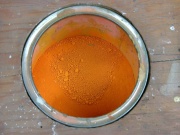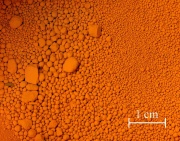Difference between revisions of "Chrome red"
m (Text replace - "== Authority ==" to "== Sources Checked for Data in Record ==") |
|||
| Line 3: | Line 3: | ||
A basic lead chromate pigment that ranges in shades from orange to red. First made in 1809 by Vauquelin, basic lead chromate is formed by heating [[lead chromate]] and [[sodium hydroxide]] solution. The color of chrome red or chrome orange can vary from a brown-yellow to a brick-red color depending on particle size and to the ratio of lead oxide to lead chromate. It is stable in light but is not widely used because of its sensitivity to sulfur gases. Most often, chrome red is used as an anticorrosive base coats for steel. See also [[chrome yellow]]. | A basic lead chromate pigment that ranges in shades from orange to red. First made in 1809 by Vauquelin, basic lead chromate is formed by heating [[lead chromate]] and [[sodium hydroxide]] solution. The color of chrome red or chrome orange can vary from a brown-yellow to a brick-red color depending on particle size and to the ratio of lead oxide to lead chromate. It is stable in light but is not widely used because of its sensitivity to sulfur gases. Most often, chrome red is used as an anticorrosive base coats for steel. See also [[chrome yellow]]. | ||
| − | |||
[[File:Lead.chromate.basic_det.jpg|thumb|Chrome red]] | [[File:Lead.chromate.basic_det.jpg|thumb|Chrome red]] | ||
| Line 10: | Line 9: | ||
red lead chromate; Pigment Red 103; CI 77601; Chromrot (Deut.); rouge de chrome (Fr.); rojo de cromo (Esp.); rosso cromo (It.); vermelho de crómio (Port.); Persian red; Austrian red; Derby red; Chinese red; Vienna red; Victoria red; American vermilion; garnet chrome; ruby red chrome; Austrian cinnabar | red lead chromate; Pigment Red 103; CI 77601; Chromrot (Deut.); rouge de chrome (Fr.); rojo de cromo (Esp.); rosso cromo (It.); vermelho de crómio (Port.); Persian red; Austrian red; Derby red; Chinese red; Vienna red; Victoria red; American vermilion; garnet chrome; ruby red chrome; Austrian cinnabar | ||
| − | == | + | == Risks == |
| + | |||
| + | * Toxic by inhalation or ingestion. | ||
| + | * Skin contact may cause irritation or ulcers. | ||
| + | * Carcinogen, teratogen, suspected mutagen. | ||
| + | * Discolored by heat and sulfur fumes. | ||
| + | |||
| + | ==Physical and Chemical Properties== | ||
Soluble in strong acids and alkalis. Can change to yellow in acetic acid. Insoluble in water. High birefringence. Tabular crystals. | Soluble in strong acids and alkalis. Can change to yellow in acetic acid. Insoluble in water. High birefringence. Tabular crystals. | ||
| Line 23: | Line 29: | ||
|- | |- | ||
! scope="row"| Density | ! scope="row"| Density | ||
| − | | 6.7 | + | | 6.7 g/ml |
|- | |- | ||
! scope="row"| Molecular Weight | ! scope="row"| Molecular Weight | ||
| Line 32: | Line 38: | ||
|} | |} | ||
| − | == | + | ==Resources and Citations== |
| − | |||
| − | |||
| − | |||
| − | |||
| − | |||
| − | |||
| − | |||
| − | |||
| − | |||
| − | |||
H. Kuhn, M.Curran, "Chrome Yellow and Other Chromate Pigments", ''Artists Pigments'', Volume 1, R. Feller (ed.), Cambridge University Press: Cambridge, 1986. | H. Kuhn, M.Curran, "Chrome Yellow and Other Chromate Pigments", ''Artists Pigments'', Volume 1, R. Feller (ed.), Cambridge University Press: Cambridge, 1986. | ||
| − | |||
| − | |||
* R. J. Gettens, G.L. Stout, ''Painting Materials, A Short Encyclopaedia'', Dover Publications, New York, 1966 Comment: p. 106 | * R. J. Gettens, G.L. Stout, ''Painting Materials, A Short Encyclopaedia'', Dover Publications, New York, 1966 Comment: p. 106 | ||
| Line 70: | Line 64: | ||
* ''The Merck Index'', Martha Windholz (ed.), Merck Research Labs, Rahway NJ, 10th edition, 1983 Comment: entry 5423 | * ''The Merck Index'', Martha Windholz (ed.), Merck Research Labs, Rahway NJ, 10th edition, 1983 Comment: entry 5423 | ||
| − | * Art and Architecture Thesaurus Online, | + | * Art and Architecture Thesaurus Online, https://www.getty.edu/research/tools/vocabulary/aat/, J. Paul Getty Trust, Los Angeles, 2000 |
[[Category:Materials database]] | [[Category:Materials database]] | ||
Revision as of 14:27, 29 May 2022
Description
A basic lead chromate pigment that ranges in shades from orange to red. First made in 1809 by Vauquelin, basic lead chromate is formed by heating Lead chromate and Sodium hydroxide solution. The color of chrome red or chrome orange can vary from a brown-yellow to a brick-red color depending on particle size and to the ratio of lead oxide to lead chromate. It is stable in light but is not widely used because of its sensitivity to sulfur gases. Most often, chrome red is used as an anticorrosive base coats for steel. See also Chrome yellow.
Synonyms and Related Terms
red lead chromate; Pigment Red 103; CI 77601; Chromrot (Deut.); rouge de chrome (Fr.); rojo de cromo (Esp.); rosso cromo (It.); vermelho de crómio (Port.); Persian red; Austrian red; Derby red; Chinese red; Vienna red; Victoria red; American vermilion; garnet chrome; ruby red chrome; Austrian cinnabar
Risks
- Toxic by inhalation or ingestion.
- Skin contact may cause irritation or ulcers.
- Carcinogen, teratogen, suspected mutagen.
- Discolored by heat and sulfur fumes.
Physical and Chemical Properties
Soluble in strong acids and alkalis. Can change to yellow in acetic acid. Insoluble in water. High birefringence. Tabular crystals.
| Composition | PbO-CrO3 |
|---|---|
| CAS | 7758-97-6 |
| Density | 6.7 g/ml |
| Molecular Weight | mol. wt. = 323.2 |
| Refractive Index | 2.42; 2.7 |
Resources and Citations
H. Kuhn, M.Curran, "Chrome Yellow and Other Chromate Pigments", Artists Pigments, Volume 1, R. Feller (ed.), Cambridge University Press: Cambridge, 1986.
- R. J. Gettens, G.L. Stout, Painting Materials, A Short Encyclopaedia, Dover Publications, New York, 1966 Comment: p. 106
- M. Doerner, The Materials of the Artist, Harcourt, Brace & Co., 1934
- G.S.Brady, Materials Handbook, McGraw-Hill Book Co., New York, 1971 Comment: p. 445
- Ralph Mayer, A Dictionary of Art Terms and Techniques, Harper and Row Publishers, New York, 1969 (also 1945 printing)
- Richard S. Lewis, Hawley's Condensed Chemical Dictionary, Van Nostrand Reinhold, New York, 10th ed., 1993
- Michael McCann, Artist Beware, Watson-Guptill Publications, New York City, 1979
- R.D. Harley, Artists' Pigments c. 1600-1835, Butterworth Scientific, London, 1982
- Dictionary of Building Preservation, Ward Bucher, ed., John Wiley & Sons, Inc., New York City, 1996
- Monona Rossol, The Artist's Complete Health and Safety Guide, Allworth Press, New York, 1994
- Van Nostrand's Scientific Encyclopedia, Douglas M. Considine (ed.), Van Nostrand Reinhold, New York, 1976
- The Merck Index, Martha Windholz (ed.), Merck Research Labs, Rahway NJ, 10th edition, 1983 Comment: entry 5423
- Art and Architecture Thesaurus Online, https://www.getty.edu/research/tools/vocabulary/aat/, J. Paul Getty Trust, Los Angeles, 2000

